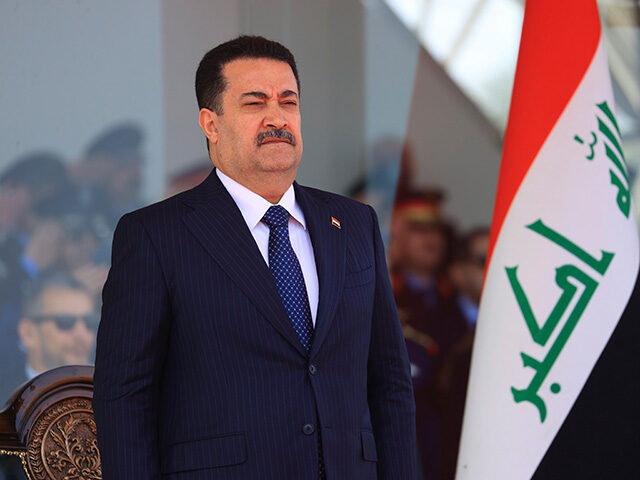Iraqi Prime Minister Mohammed Shia al-Sudani said on Tuesday he wants a “quick” withdrawal of U.S. and allied forces from Iraq, but he has not set a firm deadline for withdrawal.
His remarks were seemingly intended to resolve a conflict with the Pentagon, which said on Monday it has no plan to remove the roughly 2,500 American soldiers stationed in Iraq.
Sudani told Reuters on Tuesday that he saw U.S. troops as a “destabilizing” presence in Iraq because the Iran-controlled Shiite militia has launched dozens of rocket and drone attacks against American troops since the Gaza war began in October.
Sudani was, in essence, blaming the U.S. for antagonizing Iran’s proxies in his country by existing. He argued there was no way to halt the militia attacks except to withdraw American forces and end Israel’s war against the Hamas terrorists.
“There is a need to reorganize this relationship so that it is not a target or justification for any party, internal or foreign, to tamper with stability in Iraq and the region,” he told Reuters.
Sudani also used “reorganizing this relationship” language in December when he announced his government was “heading towards ending the presence of the international coalition forces.”
Sudani criticized those forces for conducting “military operations” that were a “violation of Iraqi sovereignty,” a reference to the Biden administration’s retaliatory airstrikes against Shiite militia targets.
At the beginning of 2023, Sudani thought foreign forces should remain in Iraq because the “elimination of ISIS needs some more time,” but by the end of the year, he was seething against U.S. demands for his government to rein in the Shiite militias, while the Shiites flexed their political influence in Baghdad to ensure no such action would be taken.
Sudani’s administration has denounced the Shiite militia attacks and claims to have thwarted a few of them, but it has offered nothing like the aggressive crackdown the Biden administration hoped for. The Shiite militias are nominally deputized members of the Iraqi military, operating under the rubric of “Popular Mobilization Forces” enlisted against the Islamic State, so critics wonder why Baghdad does not order them to back off — with the promise of arresting or shooting them if they refuse.
“We stress our firm position in ending the existence of the international coalition after the justifications for its existence have ended,” he said last Friday, the day after a U.S. drone strike in Baghdad reportedly killed a Shiite militia leader.
Sudani clearly made it sound like American withdrawal would be swift and imminent, but Pentagon spokesman Maj. Gen. Patrick Ryder said on Monday he was “not aware of any plans” to pull U.S. troops out of Iraq, nor was he aware of any official Iraqi request to the U.S. Department of Defense (DoD) to remove them.
“We continue to remain very focused on the ‘defeat ISIS’ mission,” Ryder said, stressing that American troops are in Iraq because Baghdad invited them.
On Tuesday, Sudani moderated his tone somewhat and said he was not looking for the immediate exit of American troops.
“Let’s agree on a time frame that is, honestly, quick, so that they don’t remain long and the attacks keep happening,” he said.
“Ending (the U.S. military) presence will prevent more tensions and the entanglement of internal and regional security issues,” he contended. “The U.S. is not an enemy to us and we are not at war with it, but if these tensions continue it will definitely impact and create a gap in this relationship.”
Sudani argued that ending the Gaza war was “the only solution” to unrest in Iraq — and if the war continues for much longer, “we will see more expansion of the arena of conflict in a sensitive region for the world that holds much of its energy supply.”
As Sudani’s interviewers at Reuters pointed out, Iraq is the second-largest producer in the Organization of the Petroleum Exporting Countries (OPEC), so the Iraqi prime minister was not-so-subtly warning that his country’s oil production could be compromised if Israel does not declare a cease-fire in Gaza.

COMMENTS
Please let us know if you're having issues with commenting.